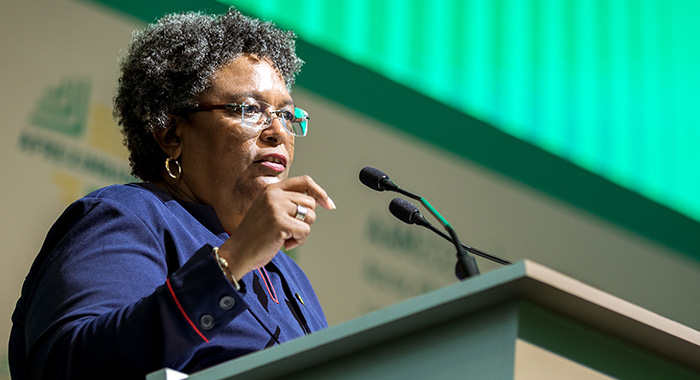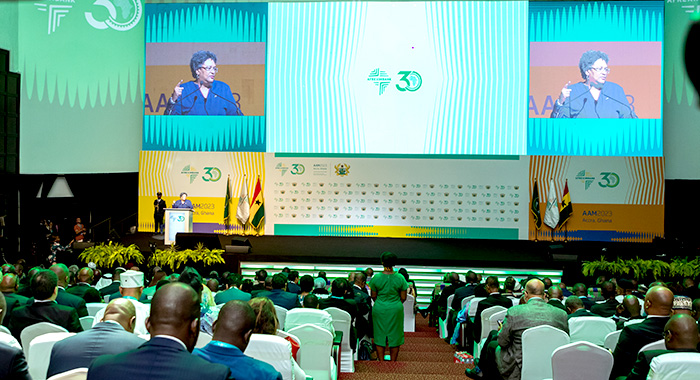By Kenton X. Chance
ACCRA, Ghana (CMC) — Barbados Prime Minister Mia Mottley is leaving here for France to attend the Paris Peace Forum Summit 2023, which opens on Thursday.
But before her departure, she told the annual meetings of the 60-member Africa Ex-Im Bank that the “new middle passage is effectively about us taking control”.
Mottley told the bank’s 30th annual meetings, which wrapped up here on Tuesday, that during the Middle Passage, Africans were the victims.
The Middle Passage refers to the forced voyage of millions of enslaved Africans across the Atlantic Ocean to the New World from about 1518 to the mid-19th Century.
“The new middle passage we must be the directors and the beneficiaries,” Mottley said as she delivered a keynote on “A New Middle Passage by Africans for Africans – Strengthening Interconnectivity between Africa and its Diaspora for Shared Prosperity”.
“For that to happen, it means therefore, that we must have the institutional framework in order and that is why, whether it is with respect to the institutional arrangements of the AU-CARICOM, and as we heard Prime Minister (Ralph) Gonsalves say…the ABCD (Africa, Brazil, Caribbean and African Diaspora) Commission, which quite frankly, can house the blue ribbon panel that I’ve asked for to meet urgently to be established and to meet urgently on connectivity,” Mottley said.
She noted that the ABCD Commission effectively includes a quarter of the world’s population,
“But, secondly, people will only trump if they have a weapon. And the weapon in today’s world that others understand is finance,” Mottle said., adding, “And that is why the Bridgetown Initiative is so important to us.
“And that is why some of us leave here to go to Paris as a staging point, not as a destination. Paris is not a pledging conference, Paris is not about getting definitive decisions because all who are needed for that are required in a multilateral process.”
The Bridgetown Initiative is Mottley’s proposal to address three interconnected crises, namely the cost of living crisis stemming partly from the war in Ukraine and the COVID-19 pandemic; a developing country debt crisis following the COVID-19 pandemic and climate-related disasters, and; the climate crisis as the glaciers melt and storms and droughts intensify.
Mottley said the Paris talks are about boosting ambition and increasing solidarity.
She said she had learnt at the Afreximbank meeting the phrase “prejudice premium”, which, she said, attaches to the cost of finance in the global south.
“And that therefore, is what we must fight against,” she said, noting that the Bridgetown Initiative says “let us look at reforming the multilateral system.
“The international financial institutions that govern so much of what we do were created when we were not even independent nations …” Mottley said.
“It also means that not only should we get them to understand our journey, but we need them to understand that we need long-term capital to do much of what has to be done.
“It cannot be that it is easier for us citizens to get a 25-year mortgage than it is for a country to be able to borrow for development of schools or hospitals. The terms which we are given are invariably 10, 15 and 20 years.”

The Barbados prime minister pointed to Britain as an example, saying that in order to be able to recover from World War I, London issued bonds in 1914 and 1917.
“By 1932, they realised that they could not repay for the war while borrowing for the reconstruction of Britain. And therefore those two bonds were replaced with a perpetual bond that was not prepared until 2014.”
She said that similarly, when Germany lost the war, the North Atlantic countries came together in a pact to be able to determine that Germany should not repay more than three to four per cent of its exports in debt service.
“We simply say that particularly as we fight the development challenges as expressed by the sustainable development goals including, in particular, the climate crisis, that we need to be able to have access to long-term capital, and it therefore means a significant rethink of how the multilateral development institutions function,” Mottley said.
“It may mean that we have to move beyond public capital financing the World Bank, and we understand that because most multinational corporations have a balance sheet that is bigger than two-thirds of the world’s countries’ and therefore they have to be brought to the table if we’re going to be able to amplify the resources to be able to meet the challenges of this poly-crisis moment, from climate, to inflation, to pandemic to the other challenges of digital divide, and lack of educational opportunities, and poor access to health care as a result of the consequences of the pandemic.”
She called for a review of the history of debt sustainability, noting that the Maastricht Treaty, among others, set a 60 per cent debt-to-GDP ratio, and developing countries “fell in line”.
“Problem is that everything that we were told to do, as I said this morning, they’ve done otherwise and what has happened now is that almost every single European country has a debt-to-GDP ratio in excess of 90 per cent. They admit and concede that they can’t easily change their treaty arrangements. But if we don’t change the anchor, if we continue to use 60%, it means that the trajectory that Ghana that Barbados to all of us will have to face will be too steep,” Mottley said.
She said what is needed is ”a gradual approach to the debt sustainability.
“And we’ve also determined that there is a broader appetite for that kind of tolerance so that others have begun to understand you can bring back debt overnight, but you cannot recover from social implosion in under a generation.”
She said that if “too much austerity, as the United Kingdom is finding out a la David Cameron, has left you in this position, you are literally weakening your institutions and your human capacity to fuel growth as we go forward.
“We also believe that separate from the reform of the multilateral development bank’s and the increased capital, separate from the long term nature of the capital, we need to borrow the debt sustainability that we need to be able to lower and level the cost of debt for the private sector, particularly in the global south. But we use first and foremost the objective of climate mitigation to do so.”
She said this means climate mitigation, adding that it matters not whether it takes place in Africa, Europe, the Caribbean or the Antarctic.
“The important thing is to keep the world’s temperatures, the planet’s temperatures, below 1.5 degrees (above pre-industrialisation level). And therefore, we need to be able to create a mechanism that avoids the prejudice premium, that avoids the fact that most private sector people will tell you, ‘Oh, we don’t understand the risk in Africa. We don’t understand the risk in the Caribbean or Latin America.”
She said some of this might be a currency risk, adding that the International Fund is well placed to be able to help us deconstruct this.
“Some of it may be unconscious bias. I don’t know. But what I do know is that the … project that was enough to much fanfare in Glasgow for South Africa, has not yet gotten off the ground. And a large part of it is that the cost of capital is simply too high, too expensive, as compared to what it would be in the North Atlantic countries,” Mottley said.






